 |
| One of our orange trees. |
May 30, 2013
Not a word about the Sears catalog
Dec 3, 2010
Rains leave thousands homeless in Venezuela
 |
| A normal rainy season in Monagas. |
More than 30 dead from heavy rains in Venezuela
December 02, 2010 16:44 EST
CARACAS, Venezuela (AP) -- President Hugo Chavez says more than 30 people have been killed in floods and landslides in Venezuela, and he is pledging to speed construction of public housing to help thousands of evacuees.
Speaking to evacuees on Thursday, Chavez said they would receive homes and vowed to accelerate construction of public housing projects in the Caracas area.
Chavez said the government was assisting more than 15,000 families that fled homes amid torrential rains. He said the government has more than 300 disaster shelters open across the country.
The heavy rains during the past month have continued well past the usual end of the wet season in Venezuela.
Venezuela Responds to "Heaviest Rains in Over 40 Years"
By Juan Reardon – Venezuelanalysis.com
Mérida, December 1st 2010 (Venezuelanalysis.com) – Venezuela's national government on Tuesday extended to four states the emergency decreed 10 days ago in response to torrential rains that have battered the country since early November. According to the presidential commission assigned to manage the storm's affects on Venezuela's people and its infrastructure, almost 11,000 security forces are currently mobilized to help with emergency measures, including food aid distribution, evacuations, housing shelter management and road repairs. According to Spain's El País news source, as of Tuesday night the storm's death toll reached 29 people, including several children.
Due to dangerous conditions provoked by the storms, the states of Vargas, Miranda and the Capital District of Caracas joined Falcon yesterday in the government-decreed state of emergency.
According to weather experts at the Central University of Venezuela (UCV), this November's rains were the heaviest seen in Venezuela in over 40 years. Rain is expected to continue for the next 48 hours.
Vice President Elias Jaua confirmed on Tuesday that rains have forced some 5,500 people to flee their homes and that an additional 56,000 have been negatively affected. Jaua also announced the suspension of classes at all levels of education in 11 of Venezuela's 23 states so as to "protect Venezuela's children" and "allow rescue teams greater movement on roads into flooded areas."
As of Wednesday morning, over 33,000 people have been attended by the government's emergency support services, with a total of 259 refuge centers currently providing government-managed emergency shelter. In addition, several dozen schools opened their doors to rain victims as temporary residences and private hotels in and around the Caracas area ceded some 850 rooms to the government's emergency housing efforts.
Of the 10,988 security forces mobilized to assist in aid efforts, 5,000 are members of the Bolivarian Armed Forces, 2,331 are volunteers of the Bolivarian Militia and 3,657 are of the Civil Protection Services.
President Hugo Chávez on Sunday offered Miraflores Presidential Palace as a "symbolic" place of refuge for 100 people, or 26 families. "Today I have ordered that they move to Miraflores…where we recently built rooms, small residential units, for the comrades of the security [staff]," said Chávez who cancelled his weekly television address to visit affected areas of Falcon state.
Over half of those affected by rains, 35,000 people, live in western Falcon state. Hotel Venetur, in the area of Tucaca of Falcon, opened its doors to hundreds of families.
Venezuela's Ministry of Science and Technology informed residents of Falcon state that all users of Movilnet cell phone services received a one-time supplement of 25 bolivars of cell phone credit as well as 50 free text messages so as to communicate with their families. The Ministry also informed residents that, as of December 1st, all public phones in the state will allow callers three minutes of free calling time.
Nationwide, 112 roads have been damaged and transit is limited as a result. Jaua on Wednesday called for drivers from eastern Venezuela to avoid heading towards Caracas, unless absolutely necessary. These roads, according to Jaua are being repaired "by 220 machines sent out by the government, with the support of the private sector."
Oil refineries in Zulia state suffered electrical shortages as a result of the storms, though Venezuela's state-owned firm PDVSA confirmed that "gasoline supplies to the national and international markets are guaranteed."
In Miranda, an important source of agricultural production for the population of Caracas, 66,000 hectares of agricultural lands have been flooded.
Venezuela's Maiquetia International Airport this week was forced to defer a number of international flights to smaller, less-affected airports while a number of both national and international flights have been cancelled.
"Regrettably in Venezuela we don't have a preventative culture," said Víctor Lira, Director of Venezuela's Civil Protection Services. "[A culture] that first investigates, does the corresponding studies, before placing residential units on unstable grounds."
"Because there aren't sufficient housing solutions for the people, the people look for solutions on their own account," affirmed Lira. "For this reason people tend to invade terrains, they weaken protective soil cover, they build on anything, there is no management of residential waters, and all these are factors that add up."
On Wednesday, as Chávez received 26 affected families at Miraflores Palace, he called on all Venezuelans, including ministers, governors and mayors, to open their homes to flood victims.
"This is a national emergency, and it is time to leave aside personal comforts, egoisms, and open our hearts and homes to our fellow Venezuelans," said Chávez on Venezuela de Television (VTV). He also called on the offices of the vice presidency, publicly owned Channel 8 and other government-owned buildings to remodel one floor of each building for emergency housing. Chávez assured the families that within one year they will leave Miraflores and move directly into their own homes or apartments.
Venezuela's National Assembly on Tuesday approved the first of two drafts of the Emergency Law for Housing and Urban Terrain which, according to the Venezuelan News Agency (AVN), allows the State to "decree the creation of emergency zones for the occupation of urban terrain apt for housing." If and when this new law is passed, lands that are either "unused or underutilized" – including a number of extensive golf courses located near major highways outside of Caracas referred to by Chávez last Sunday – become possible targets for expropriation.
Published on Dec 1st 2010 at 6.16pm
Related articles
- Venezuela Death Toll Climbs, Rains Displace Thousands (businessweek.com)
- More than 30 dead from heavy rains in Venezuela (foxnews.com)
- Venezuelan flood victims can stay at presidential palace, says Hugo Chávez (guardian.co.uk)
Dec 2, 2010
Goodbye, Grandma, God bless you
 She was born Clara Helen Viola Kurth, January 16, 1917, in Haakon County, South Dakota. Years later she would tell me that, as the last of seven children, her parents gave her all the names of female relatives for whom they had yet to name a girl.
She was born Clara Helen Viola Kurth, January 16, 1917, in Haakon County, South Dakota. Years later she would tell me that, as the last of seven children, her parents gave her all the names of female relatives for whom they had yet to name a girl.She died November 27, 2010, having outlived her parents, all of her siblings, two husbands and two of her five children. She was my last surviving grandparent and one of the greatest of the great cloud of witnesses that have surrounded me all my life.
Grandma grew up on the Kurth homestead southeast of Philip, SD. As a teenager, she would cook for the men that her father hired for his threshing crew. One of the young men was my grandfather, Anthony Hollis Hemmingson. They were married on September 29, 1935, and stayed together until Grandpa´s death on November 11, 1979.
 |
| The Kurth homestead still stands. |
 |
| Anthony Hollis Hemmingson |
In 1969 Grandma and Grandpa moved to Lovington, New Mexico, as the South Dakota winters were becoming hard on my grandfather's arthritis. Grandpa passed away in New Mexico, as did my Uncle Tony (Anthony Richard) Hemmingson in 1996, her second husband, Orville "Tim" Long in 1997, and my Uncle Loren Hemmingson in 1998. Nevertheless, she continued to live in New Mexico until 2004.
Grandma's faith was a never-failing source of consolation to her during those years of loss. She and Grandpa were both baptized and confirmed as Lutherans and received Word and sacrament regularly, first at Zion Lutheran Church in Kadoka and later at Our Savior Lutheran Church in Lovington, NM. I consider this shared faith their best legacy to me.
I last saw Grandma in 2006 when Luz Maria and I visited her at my Uncle Arnie's house in Spearfish, SD. We both knew it probably would be our last meeting in this life, and she was moved to tell me how glad she was that I had found Luz Maria.
Grandma's body will be buried next to that of my grandfather in the Lovington, NM, cemetery. Their common epitaph, “For by grace are you saved through faith” (Ephesians 2:8). This also is the basis of the hymn, “By Grace I'm Saved, Grace Free and Boundless,” by Christian Scheidt, 1709-1761.
By grace I'm saved, grace free and boundless;
My soul, believe and doubt it not.
Why stagger at this word of promise?
Hath Scripture ever falsehood taught?
Nay; then this word must true remain;
By grace thou, too, shalt heav'n obtain.
By grace! None dare lay claim to merit;
Our works and conduct have no worth.
God in His love sent our Redeemer,
Christ Jesus, to this sinful earth;
His death did for our sins atone,
And we are saved by grace alone.
By grace! Oh, mark this word of promise
When thou art by thy sins opprest,
When Satan plagues thy troubled conscience,
And when thy heart is seeking rest.
What reason cannot comprehend
God by His grace to thee doth send.
By grace God's Son, our only Savior,
Came down to earth to bear our sin.
Was it because of thine own merit
That Jesus died thy soul to win?
Nay, it was grace, and grace alone,
That brought Him from His heavenly throne.
By grace! This ground of faith is certain;
So long as God is true, it stands.
What saints have penned by inspiration,
What in His Word our God commands,
What our whole faith must rest upon,
Is Grace alone, grace in His Son.
By grace to timid hearts that tremble,
In tribulation's furnace tried,--
By grace, despite all fear and trouble,
The Father's heart is open wide.
Where could I help and strength secure
If grace were not my anchor sure?
Jul 5, 2008
10th baptism in La Caramuca
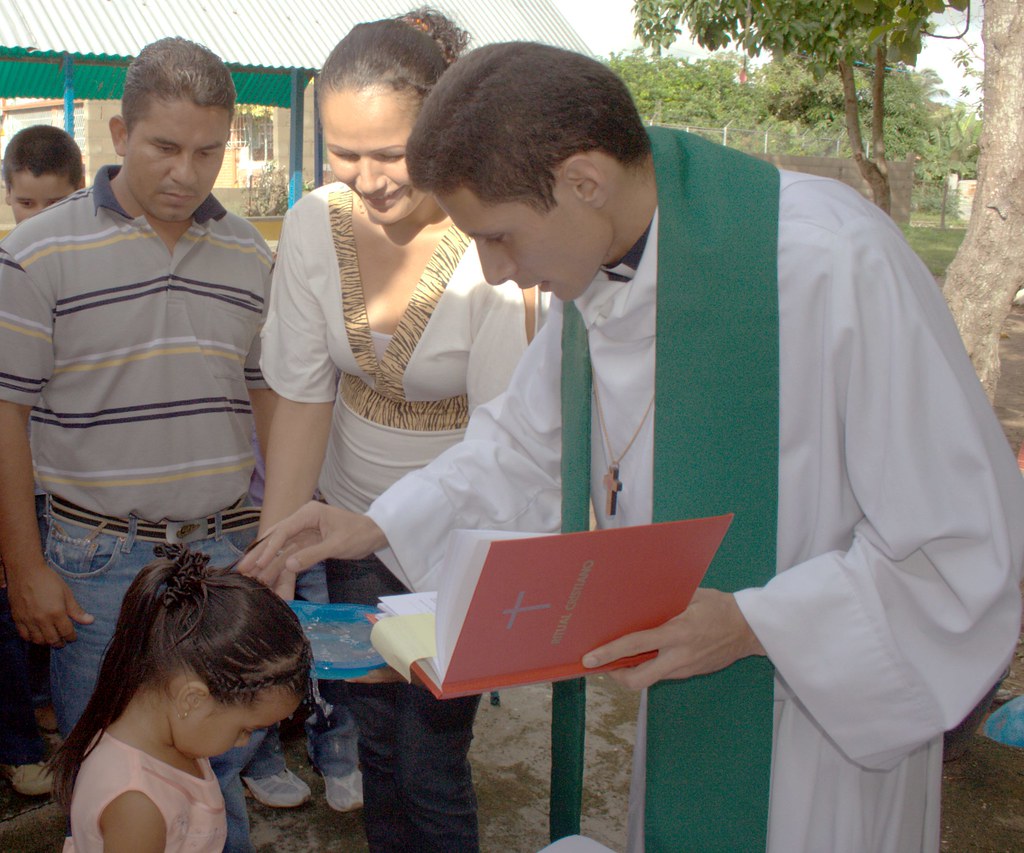
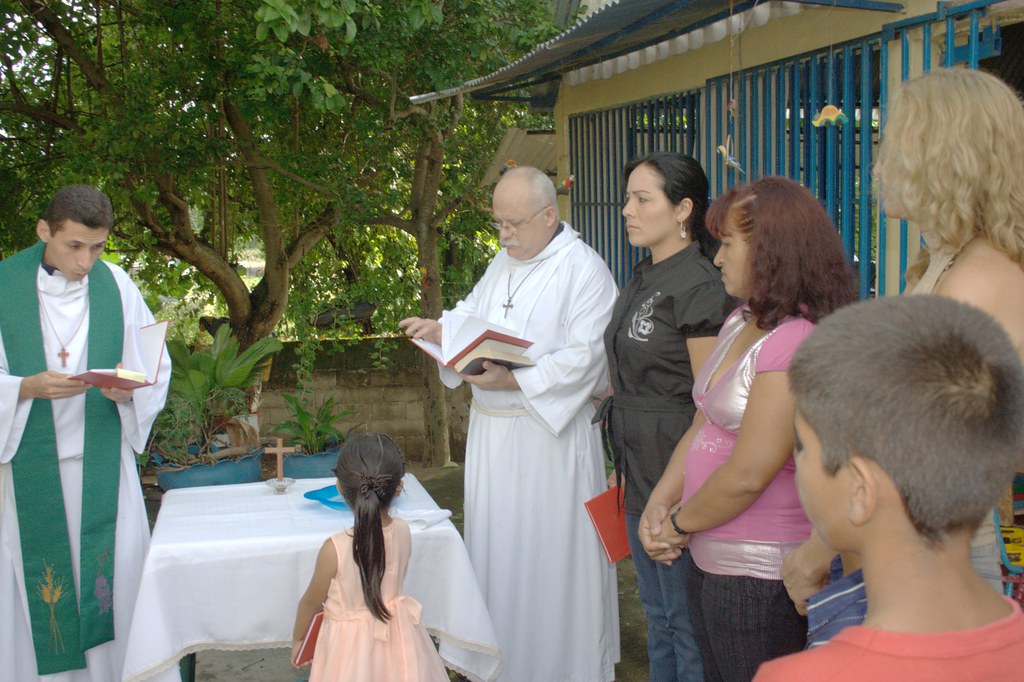
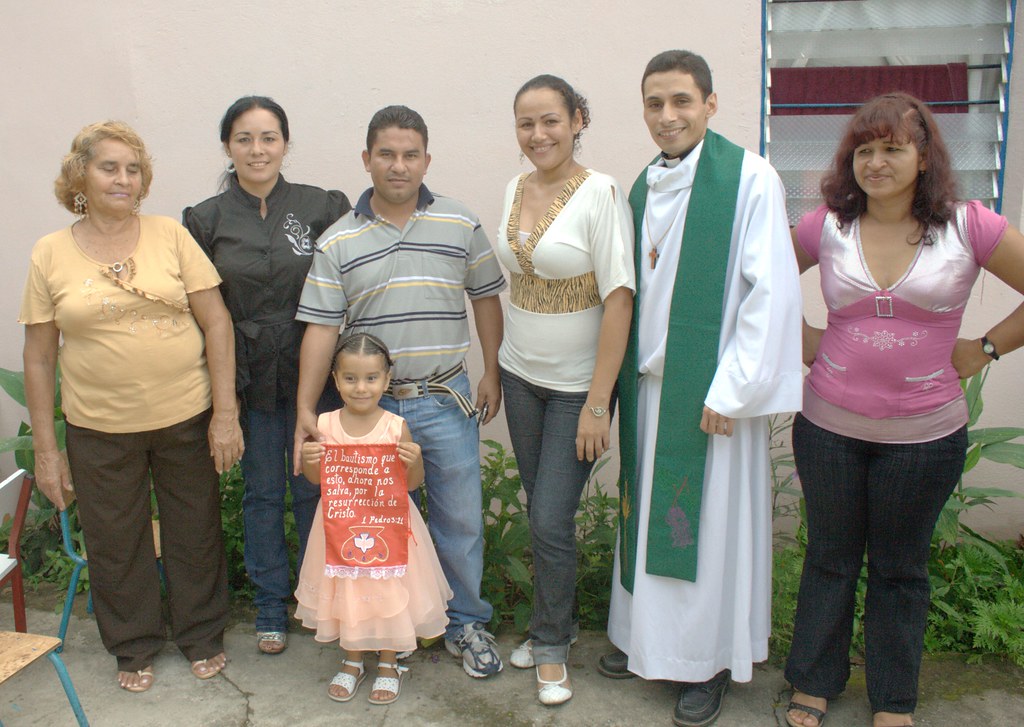 Genesis Noeli Marquina Villamizar was baptized June 29, 2008, in La Caramuca. I assisted Pastor Miguelángel Pérez in this, the 10th baptism here since we started our mission project in 2004.
Genesis Noeli Marquina Villamizar was baptized June 29, 2008, in La Caramuca. I assisted Pastor Miguelángel Pérez in this, the 10th baptism here since we started our mission project in 2004.Genesis, who is one of the children enrolled in our preschool, was born in 2004. It is sobering to realize that many of the preschool children were not yet born when I first visited Venezuela in 2002. Of course, this includes Luz María's three youngest grandchildren. Her fourth-oldest grandchild, Oriana, was an infant when I met Luz María. Now Oriana is nearly six years old.
Sponsors at the baptism included two relatives, Angelmiro Camacho and Ana Julia de Toro Peña, Yepci, Luz María's oldest daughter, and Eduardo, my partner-vicar. There were more than 30 people, children and adults, present for the baptism that Sunday afternoon. Eduardo was not actually present, since he took Miguelángel's place, preaching in Barquisimeto. But Genesis loves Eduardo, so we made sure his name was on the baptismal certificate.
Noel and Jefferson, the two older brothers of Genesis, have been faithfully attending our Sunday school. The boys received the sacrament of holy baptism as infants from a Roman Catholic priest, but Genesis never did, due to the influence of a relative who converted to Pentecostalism.
For hundreds of years, Venezuelans regarded baptism in a Roman Catholic church essentially as an insurance policy in case the Christian God turned out to have the last word after all. They were not helped in their understanding by Roman Catholic teaching which emphasizes the ritual of baptism as being efficacious in and of itself, apart from the Holy Spirit working within the heart and daily life of the believer.
Nevertheless, as Lutherans, we agree with Roman Catholics that God has instituted the sacrament of baptism as the visible means by which the believer receives the promise of eternal life in Christ and thus the regeneration of the Holy Spirit.
However, over the last 30 to 40 years, the influence of the Roman Catholic Church has waned in Latin America. This may be largely the result of a worldwide shortage of priests as well as a general dissatisfaction with established institutions due to the persistent wide gap between the rich and the poor in this part of the world. During this same period, most traditional Protestant churches have greatly reduced missionary efforts in Latin America, leaving the field open to Pentecostal/charismatic groups which teach that all may have direct access to the Holy Spirit apart from the authority of the inspired Scriptures and the sacraments instituted by Christ Himself.
Luther recognized the corrosive effect of this idea on any objective standard of faith when he said of the Zwickau Prophets, “They have swallowed the Holy Spirit, feathers and all.” Indeed, one of the most active groups in Venezuela today is the United Pentecostal Church, a “charismatic” body that denies the fundamental doctrine of the Trinity. Under the Pentecostal umbrella there are many other lesser-known heresies, generated by leaders who claim “apostolic” authority apart from either an ecclesiastical hierarchy or the Holy Scriptures.
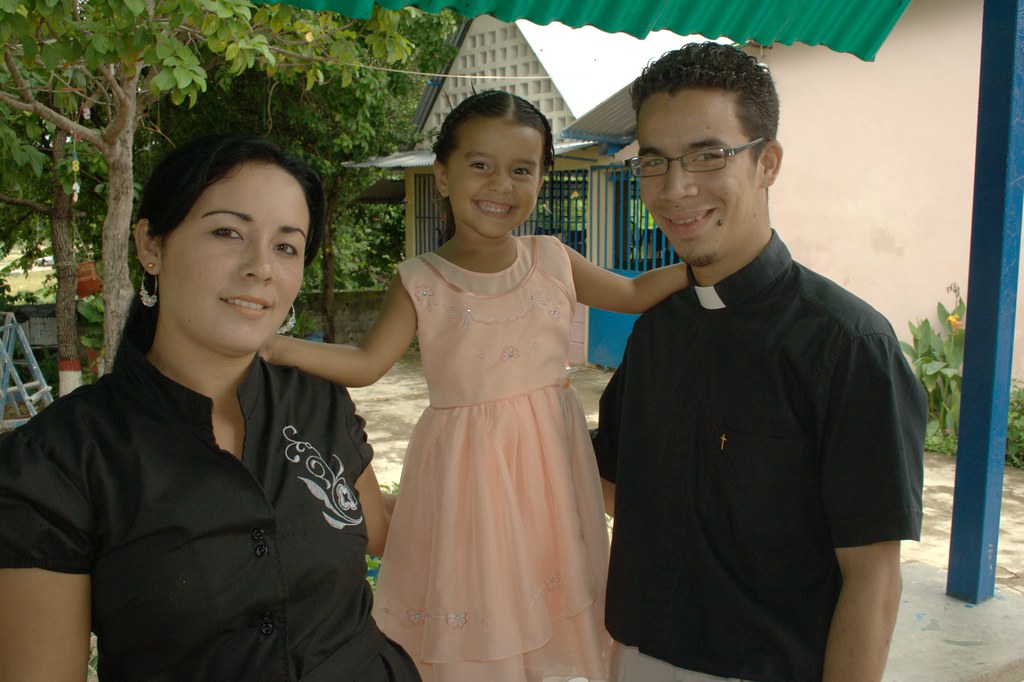 And certainly Pentecostal theology fits in well with the syncretistic stew that is popular religion in Venezuela. The idea of daily supernatural revelations and interventions is very consistent with the practice of brujeria and espiritismo, as is the “health and prosperity” gospel which claims that if you pray hard enough, God will bless you with all of your earthly desires. In fact, this aspect of Pentecostalism may be the most popular of all here.
And certainly Pentecostal theology fits in well with the syncretistic stew that is popular religion in Venezuela. The idea of daily supernatural revelations and interventions is very consistent with the practice of brujeria and espiritismo, as is the “health and prosperity” gospel which claims that if you pray hard enough, God will bless you with all of your earthly desires. In fact, this aspect of Pentecostalism may be the most popular of all here.Finally, there is the notion that if you may receive a “baptism of the Spirit” apart from the visible means of grace, “water baptism” is not necessary at all, despite our Lord's command. We praise God that after hearing Luz María explain the blessing of holy baptisms to the mothers of our preschool children, Zoraida, Genesis' mother, decided she wanted this gift for her daughter. Eduardo and I, and finally Miguelángel, had further meetings with the family to explain what we believe about baptism, and the responsibilities of parents and sponsors.
Miguelángel also preached and administered the sacrament of the Lord's Supper that Sunday morning at Corpus Christi Lutheran Church in Barinas. I do not recall now under what circumstances I first meet Miguelángel. It seems he always has been in the picture. He is about the same age as Luz María's older daughters and is an old friend of theirs from national Lutheran youth gatherings. When Luz María and I were living on Tierra de Gracia Lutheran Farm in eastern Venezuela, Miguelángel came to visit us there.
He had been studying for the ministry for nearly the whole time I have known him. He
was finally ordained March 30, 2008, and now serves as the pastor of two congregations, Cristo es Amor (Christ is Love) and El Paraiso (Paradise), in Barquisimeto. He originally was a member of Cristo es Amor.
The week before the baptism I attended a seminar in pastoral care in Caracas. Pastor Henry Witte led the seminar. He and his wife, Ruthie, served as missionaries in Venezuela for 20 years and for five years in Panama. They are back in the United States where Henry has accepted a call to Sioux City, Iowa.
The focus of the seminar was following the theology of the cross rather than the theology of glory in counseling the severely ill, the dying and the families of such people. The "health-and-prosperity gospel” is, of course, a form of the theology of glory, which says having a right relationship with God means gaining everything you want in this life. The theology of the cross, on the other hand, says suffering is part of living in a world marred by sin and that the
point of the Christian life is not to avoid suffering, but to withstand the temptation to despair through the hope of life eternal.
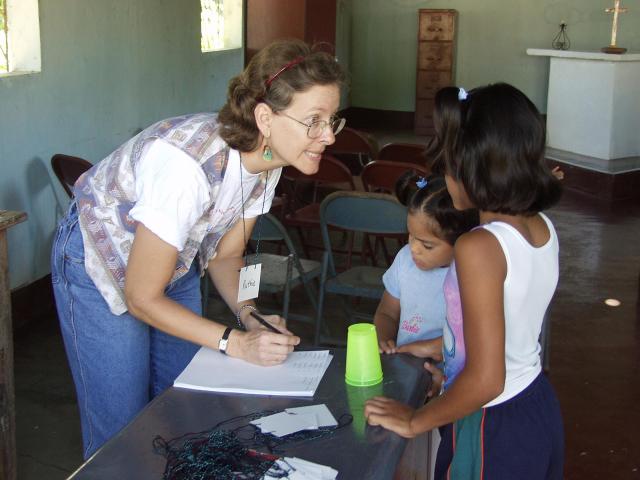 I met the Wittes on my first visit to Venezuela six years ago. Ruthie led the children in vacation Bible school in Quebrada Seca, Monagas, in the “Padre Nuestro” song which we now are using to teach our preschool children the Lord's Prayer. This past week I recorded Eduardo and his brother, Francisco Rafael, singing “Padre Nuestro” and other songs for children to guitar accompaniment. Then I burned a CD to play in the preschool even on the days when Eduardo is not able to come to La Caramuca.
I met the Wittes on my first visit to Venezuela six years ago. Ruthie led the children in vacation Bible school in Quebrada Seca, Monagas, in the “Padre Nuestro” song which we now are using to teach our preschool children the Lord's Prayer. This past week I recorded Eduardo and his brother, Francisco Rafael, singing “Padre Nuestro” and other songs for children to guitar accompaniment. Then I burned a CD to play in the preschool even on the days when Eduardo is not able to come to La Caramuca.Listen to "Padre Nuestro".
We would ask you to remember in prayer the family of former missionary Rudy Blank and his wife, Ramona. Her father, Adrian Rivero, passed away this week. Adrian was one of the first national pastors in the Lutheran Church of Venezuela and remained a member of Principe de Paz (Prince of Peace) Lutheran Church in Sierra Caroni until his death.
Oct 18, 2007
Death of Jesús Franco
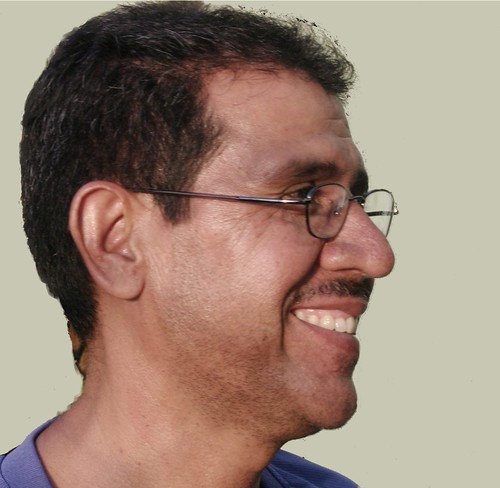 We were saddened to hear of Jesús Franco´s death. Jesús had been serving as the pastor of Cristo es Amor (Christ is Love) Lutheran Church in Barquisimeto.
We were saddened to hear of Jesús Franco´s death. Jesús had been serving as the pastor of Cristo es Amor (Christ is Love) Lutheran Church in Barquisimeto.Jesús had been in ill health for some time. As I understand what happened, exploratory surgery and other tests had been done to determine exactly what was wrong, but without success. Then, on October 4, 2007, he suddenly died at the age of 47.
That certainly gives me pause for reflection as I turn 49 this week. However, I have been working on my first sermon for homiletics class, using as my text St. Paul's second letter to Timothy, chapter 2, verses 8 to 13. The entire epistle is an excellent text for meditation on the meaning of our brief lives here on earth.
Second Timothy is Paul's swan song. In nearly all of the apostle's other letters, he speaks of his plans for the future. In Second Timothy he clearly anticipates his own death.
"For I am already being poured out as a drink offering, and the time of my departure has come. I have fought the good fight, I have finished the race, I have kept the faith. Henceforth there is laid up for me the crown of righteousness, which the Lord, the righteous judge, will award to me on that Day, and not only to me but also to all who have loved his appearing." (2 Timothy 4:6-8)
The Book of Acts ends with Paul under a relatively comfortable form of house arrest in Rome. At that time he was allowed to live under guard in a home where he could entertain fairly large groups of people. As a Roman citizen, he had appealed accusations made against him to the Emperor and he apparently expected to be acquitted (Philemon 1:19).
His second letter to Timothy was written some time later under very different circumstances. Paul again is imprisoned, but this time he is cold, isolated and lonely. He asks Timothy to visit him soon, and bring him a cloak and some books. He feels abandoned by people he thought were his friends.
There is much speculation as to what happened to Paul did between the period of house arrest described in Acts and the writing of Second Timothy. Some think he was released from his first imprisonment and perhaps went on a missionary journey to Spain as he had intended.The Scriptures do not speak of these things, nor is there an actual record of Paul's death. But according to ancient church sources, Paul was writing to Timothy from a prison cell during the first great Roman persecution under Nero. He probably was put to death at this time.
As the light of Christ was dawning on the world, Paul foresaw the remaining shadows darkening. "But understand this, that in the last days there will come times of difficulty. For people will be lovers of self, lovers of money, proud, arrogant, abusive, disobedient to their parents, ungrateful, unholy, heartless, unappeasable, slanderous, without self-control, brutal, not loving good, treacherous, reckless ,swollen with conceit, lovers of pleasure rather than lovers of God, having the appearance of godliness, but denying its power." (2 Timothy 3:1-5)
And, "For the time is coming when people will not endure sound teaching, but having itching ears they will accumulate for themselves teachers to suit their own passions, and will turn away from listening to the truth and wander off into myths." (2 Timothy 4:3-4)
Because of this, "...all who desire to live a godly life in Christ Jesus will be persecuted, while evil people and impostors will go on from bad to worse, deceiving and being deceived." (2 Timothy 3:12-13)
As it happened, the persecution of the church under Nero would prove only the beginning. Over the next 250 years, persecution by the Roman government would continue, only becoming more vicious as the number of Christians in the Empire grew. But this time of trial finally came to an end when Constantine, the first Christian emperor, in 313 A.D. signed an edict which guaranteed religious liberty for all.
Of course, the brief period of tolerance that followed did not last forever, either, as the days of the Roman Empire itself were numbered. The institutional church itself would gain worldly power, drift into false doctrine and persecute those who preached the pure Gospel.
Down through the centuries and to this day, Christians have had to risk imprisonment, torture and execution for their faith. A good source of information about this is www.persecution.com, the official Web site of Voice of the Martyrs. This organization was founded by the late Richard Wurmbrand, a Lutheran pastor who was imprisoned for 14 years by Communists in his native Romania.
But Paul, cold and alone in his prison cell, was nonetheless filled with hope and joy, and ready to accept death with peace. He gave thanks that God had brought him through many trials and tribulations and would take him home in the end.
"But the Lord stood by me and strengthened me, so that through me the message might be fully proclaimed and all the Gentiles might hear it. So I was rescued from the lion’s mouth. The Lord will rescue me from every evil deed and bring me safely into his heavenly kingdom. To him be the glory forever and ever. Amen." 2 Timothy 4:17-18)
Paul also had the assurance that despite his own imprisonment and execution, the preaching of the Gospel could not be silenced because it had the power and promise of God behind it. He notes in 2 Timothy, chapter 4, that there are others who are continuing the work.
"Remember Jesus Christ, risen from the dead, the offspring of David, as preached in my gospel, for which I am suffering, bound with chains as a criminal. But the word of God is not bound! Therefore I endure everything for the sake of the elect, that they also may obtain the salvation that is in Christ Jesus with eternal glory.
"The saying is trustworthy, for: If we have died with him, we will also live with him; if we endure, we will also reign with him; if we deny him, he also will deny us; if we are faithless, he remains faithful — for he cannot deny himself." (2 Timothy 2:8-13)
In Christ, we are guaranteed nothing and everything. We are not promised wealth and fame, or even a life of modest comforts. But we are promised the He Himself will stand with us in times of trial, in the hour of our death and beyond. May He grant us all the courage, perseverance and patience of those who have gone before us, confessing Him faithfully to the end.
 Speaking of the fleeting nature of human existence, it has been interesting to observe that the children who have been attending our Sunday school in La Caramuca since we began three years ago are not exactly children anymore. They are entering adolescence and five are enthusiastically studying Luther's Small Catechism in hopes of eventual confirmation. One example is Jordi Duque who takes what he learns in confirmation class home with him and discusses it all with his mother and two brothers. He also leads a prayer circle at home. (Last year Jordi gave me a Father's Day card because he did not have a male relative he could think of as a father figure.)
Speaking of the fleeting nature of human existence, it has been interesting to observe that the children who have been attending our Sunday school in La Caramuca since we began three years ago are not exactly children anymore. They are entering adolescence and five are enthusiastically studying Luther's Small Catechism in hopes of eventual confirmation. One example is Jordi Duque who takes what he learns in confirmation class home with him and discusses it all with his mother and two brothers. He also leads a prayer circle at home. (Last year Jordi gave me a Father's Day card because he did not have a male relative he could think of as a father figure.) Luz María and I were both busy last week at the second annual Congress of Lutheran Educators in Caracas. Lutheran teachers from both public and private schools came together for four days of seminars and other activities. Most of the Congress took place at El Salvador Lutheran Church and its Concordia Lutheran School, but Sunday we rented a bus to take everyone to La Paz Lutheran Church in Petare.
Luz María and I were both busy last week at the second annual Congress of Lutheran Educators in Caracas. Lutheran teachers from both public and private schools came together for four days of seminars and other activities. Most of the Congress took place at El Salvador Lutheran Church and its Concordia Lutheran School, but Sunday we rented a bus to take everyone to La Paz Lutheran Church in Petare.You can see all the pictures I took here.
This week we had a van from la Fundación del Niño (Children's Foundation) bring beauticians to the preschool. They gave all the children haircuts.
 Finally, I would like to announce that I am changing to a new system of managing my newsletter mailing list. I have set up a Yahoo Group for this purpose. If you would like to continue receiving an e-mail newsletter from me on a regular basis, please join this group at http://groups.yahoo.com/group/venezuelaview/
Finally, I would like to announce that I am changing to a new system of managing my newsletter mailing list. I have set up a Yahoo Group for this purpose. If you would like to continue receiving an e-mail newsletter from me on a regular basis, please join this group at http://groups.yahoo.com/group/venezuelaview/I sent everyone invitations to join the group via Yahoo Groups, but I know many of you did not receive one because the spam filter maintained by your e-mail service provider blocked it (not that there is anything wrong with that). Thank you for your patience and support.
Jul 13, 2007
Elemental spirits and vain philosophy
Colossians 2:8
I rely on the Internet to keep up with what is going on in the world outside of Venezuela. One blog that I regularly read is getreligion.org. On this site, professional journalists of various religious backgrounds post comments about how the "mainstream media" covers news about religion.
One contributor is Mollie Ziegler Hemingway, a Washington, D.C.-based journalist who is also a member of the Lutheran Church - Missouri Synod and, in fact, a pastor's daughter. On June 28, 2007, she cited a Los Angeles Times article that she thought was a good example of writing about religion, especially for the sports section of a newspaper. The article actually had to do with Venezuela.
More specifically, it had to do with Santeria and Ozzie Guillen, the Venezuelan who is manager of the Chicago White Sox. Guillen became a national hero here after the White Sox won the World Series. Here is what sportswriter Kevin Baxter reported about Guillen:
"Guillen’s religion is Santeria, a largely misunderstood Afro-Cuba spiritual tradition that incorporates the worship of orisha — multidimensional beings who represent the forces of nature — with beliefs of the Yoruba and Bantu people of Africa and elements of Roman Catholicism. And Guillen, born in Venezuela, is one of a growing number of Latin American players, managers and coaches who are followers of the faith..."
“When you talk about that religion in the States, people think you’re a monster,” said Guillen, whose children were baptized in the Catholic faith and have become, like their father, babalaos (followers of Santeria). “Sometimes you have to be careful what you say about religion and when and how.
"Because in this country there’s so many different ideas, people get offended so easy.
“People call me a criminal because we do stuff with blood and animals. I don’t blame these people. They believe what they believe and I believe what I believe. Have I ever killed an animal in the States to do my religion? No. I did in my country.”Ms. Hemingway's only criticism of the article was that the writer repeatedly described Santeria as "misunderstood" without offering any evidence of that being the case. My observation is that the rise of Santeria in Venezuela, Latin America and the United States is something to think about the next time you hear someone say there is no need for Christian mission work in Latin America.
In addition to Santeria, there are in Venezuela, as I have mentioned before,various other forms of witchcraft and occultism. For example, there is the cult of Maria Lionza, who combines aspects of a fertility goddess, a water elemental and elements of the Roman Catholic concept of the Virgin Mary. Even before I came to Venezuela, I was struck by pictures of a 15-foot-tall image of Maria Lionza located next to the Caracas freeway. The figure depicts a nude woman astride a tapir (a pig-like animal native to South America) who is holding a human pelvic bone above her head. Worshippers adorn this image (idol) with flowers and other offerings every year. Vibrations from heavy freeway traffic have done some structural damage to the statute and there has been talk of moving it. One proposal is to relocate it in the same district as the city's main mosque, synagogue and Maronite Catholic church. Needless to say, Muslims, Jews and Maronite Christians are as one in their lack of enthusiasm for this idea. (Ironically, the presence of a large Maronite church, and of Maronites, an ancient people from Lebanon and Syria, in Caracas is the result of native Christians fleeing the Middle East in the face of Muslim persecution).
Maria Lionza actually is supposed to "live"on a mountain in the western state of Yaracuy. Devotees gather there annually during which time it is said non-believers who value their lives are best advised to stay away.
Maria Lionza is said to be one of the three most powerful spirit-beings in Venezuela. The other two are Negro Felipe (Black Philip), an earth elemental who also represents the spirituality of African-Americans, and Chief Guaicaipuro, a wind elemental who represents the wisdom of the indigenous tribes.
July 12, 2007, marked the end of my fourth year of living in Venezuela. As the date rolled around, I took some time to reflect on some of the things I have described above and other things that I have learned during my time here. One important lesson has been the importance of apologetics (reasoned defense of Christian doctrine) in mission work. Even when working with children, as we do, a shallow understanding of what you believe and why you believe it is not enough. Subjective experience is not enough, nor, in the grand design of things, is your "personal testimony" particularly important. Above all one must present the promise of eternal life in Christ, revealed in Holy Scripture, as sure and certain. If you believe this yourself, you can do no less.
Many people want to reduce the faith once delivered to the saints to a series of vague platitudes that no one in their right mind would disagree with. For people in Latin America and other parts of the world where life is still a series of storms and trials, platitudes are not enough. Everyone needs solid truths to live by and to die by, when their last hour is at hand. If we believe we have the pure, apostolic doctrine, we cannot stand silent when there are so many peddling spiritual counterfeits.
This past Wednesday, July 12, was also the day that we had a graduation ceremony for the children that will be leaving us for first grade. Each one received a little banner inscribed with Psalm 16:7: "I will bless the Lord who counsels me and gladdens my heart."
Unfortunately I have no photos of this event. Nor do I have photos of the great progress that has been made on our new fence. My digital camera is broken (to make a long story short, it's the monsoon season here and I had to walk over a mile in a tropical downpour). Now I have to decide between getting it repaired (very expensive here; they want more than I paid for it in the first place) and seeing if someone will bring me a replacement from the United States, where anything electronic is much cheaper.
Finally I would like to note that we continue to pray for the family of Kent Heidenreich, a member of Christ Our Savior Lutheran Church, Freeburg, Illinois, who recently died in a farming accident.
Dec 22, 2006
Mark Antony Zipfel passes away
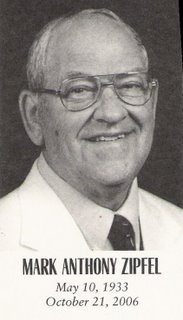 We are grateful to everyone for their prayers and support during our recent trip to the United States, but Luz Maria and I especially would like to thank the family of Mark Anthony Zipfel, a faithful member of Christ Our Savior Lutheran Church, Freeburg, Illinois, who passed away October 21, 2006, for the contribution made in his name.
We are grateful to everyone for their prayers and support during our recent trip to the United States, but Luz Maria and I especially would like to thank the family of Mark Anthony Zipfel, a faithful member of Christ Our Savior Lutheran Church, Freeburg, Illinois, who passed away October 21, 2006, for the contribution made in his name.On November 28, we flew from Caracas to Dallas-Fort Worth, where the temperature was over 75 degrees F. Then we flew to St. Louis, where the temperature was also above 75 degrees, so Luz Maria was starting to think that she would not have to endure winter at its worst in the United States. The next day, however, the St. Louis area experienced its worst ice storm in 30 years. Thousands of homes were without electricity or heat for four to five days. Fortunately for us, my mother's house was not among them.
Of course, the Pacific Northwest was hit by a much worse winter storm soon after circumstances forced us to cancel our visit to Washington state. We thank God for His grace in sparing us some trials.
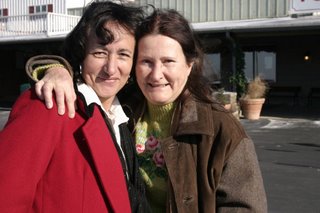 We made our presentation during adult Bible class hour Sunday, December 3, at Christ Our Savior. The people were very interested and asked many perceptive questions. Afterward we had dinner with Frank Durtschy and his wife, Erica, from Poplar Bluff, Missouri. I met Frank during long-term volunteer missionary orientation at Concordia Seminary, St. Louis, in 2003. Frank then went to Brazil while I went to Venezuela. Erica, a native of Brazil, spoke Portuguese to Luz Maria, while Luz Maria answered in Spanish, and they got along quite well that way.
We made our presentation during adult Bible class hour Sunday, December 3, at Christ Our Savior. The people were very interested and asked many perceptive questions. Afterward we had dinner with Frank Durtschy and his wife, Erica, from Poplar Bluff, Missouri. I met Frank during long-term volunteer missionary orientation at Concordia Seminary, St. Louis, in 2003. Frank then went to Brazil while I went to Venezuela. Erica, a native of Brazil, spoke Portuguese to Luz Maria, while Luz Maria answered in Spanish, and they got along quite well that way.
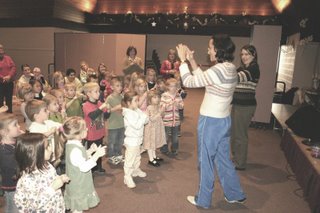 The following Monday we set out for the Twin Cities of Minnesota. On Tuesday, December 5, and Wednesday, December 6, we gave four presentations to the children of Woodbury Lutheran Preschool, Woodbury, Minnesota. The preschool, which has been in operation since 1970, offers different classes for children, ages 2 to 5, on different days of the week. We gave presentations at different times on Tuesday and Wednesday so that all the children could hear about our work in Venezuela. Woodbury Lutheran Preschool has "adopted" our preschool in La Caramuca and the children have us a generous contribution that they collected all on their own. We were pleased to talk with Dorothy Blaisdell, director of the preschool, and Nancy Kapernick, an assistant teacher that we know from her short-term mission trips to Venezuela.
The following Monday we set out for the Twin Cities of Minnesota. On Tuesday, December 5, and Wednesday, December 6, we gave four presentations to the children of Woodbury Lutheran Preschool, Woodbury, Minnesota. The preschool, which has been in operation since 1970, offers different classes for children, ages 2 to 5, on different days of the week. We gave presentations at different times on Tuesday and Wednesday so that all the children could hear about our work in Venezuela. Woodbury Lutheran Preschool has "adopted" our preschool in La Caramuca and the children have us a generous contribution that they collected all on their own. We were pleased to talk with Dorothy Blaisdell, director of the preschool, and Nancy Kapernick, an assistant teacher that we know from her short-term mission trips to Venezuela.We were also glad of the opportunity to meet with Paul Pfotenhauer, retired pastor of Woodbury Lutheran Church who has led several short-term mission teams to Venezuela, his wife Rhoda, who now serves on the Woodbury Lutheran mission board, Pastor Ben Griffin and other members of the Woodbury mission board, Dale and Elizabeth Thompson of Venezuela Lutheran Mission Partnership, and Dean Nadasdy, senior pastor of Woodbury Lutheran Church, Frank Janssen, president of Venezuela Lutheran Mission Partnership (better known to children in Venezuela as "Paco el Payaso") and Frank's wife, Kathy.
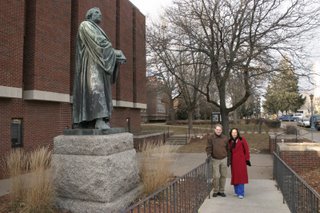 After our last presentation at Woodbury, Phil Bickel, missions pastor at St. Michael's Lutheran Church, Bloomington, Minnesota, took us on a tour of Concordia University, St. Paul. There we had the chance to visit with Dr. Robert Holst, president of the university. Later in the evening, we met with children who had participated in this year's Christmas program at St. Michael's. They also gave us a donation that they had collected themselves. We were also able to meet with many of my old friends at St. Michael's, such as Dave and Jan Veith, Bob and Sandy Johnson, Lisa Brackmann, Todd Kreft, Ruth Meier, Milo Swanton, and Sarah and Jason Bjork. I had not seen the Bjorks since we went through 2003 volunteer orientation together and we had parted ways: Japan for the Bjorks, Venezuela for me. It was interesting to compare experiences of culture shock in Japan vs. culture shock in Venezuela.
After our last presentation at Woodbury, Phil Bickel, missions pastor at St. Michael's Lutheran Church, Bloomington, Minnesota, took us on a tour of Concordia University, St. Paul. There we had the chance to visit with Dr. Robert Holst, president of the university. Later in the evening, we met with children who had participated in this year's Christmas program at St. Michael's. They also gave us a donation that they had collected themselves. We were also able to meet with many of my old friends at St. Michael's, such as Dave and Jan Veith, Bob and Sandy Johnson, Lisa Brackmann, Todd Kreft, Ruth Meier, Milo Swanton, and Sarah and Jason Bjork. I had not seen the Bjorks since we went through 2003 volunteer orientation together and we had parted ways: Japan for the Bjorks, Venezuela for me. It was interesting to compare experiences of culture shock in Japan vs. culture shock in Venezuela.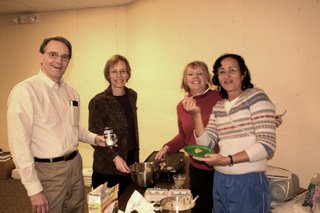 During the dinner meeting, Sue Timmerman of the "Pampered Chef" cooking show prepared cachapas, a traditional Venezuelan corn-meal pancake. Luz Maria really enjoyed the meal.
During the dinner meeting, Sue Timmerman of the "Pampered Chef" cooking show prepared cachapas, a traditional Venezuelan corn-meal pancake. Luz Maria really enjoyed the meal.Following our return to my mother's house from Minnesota, my mother drove us out to Oak Ridge, Tennessee, where we spoke at Faith Lutheran Church on Sunday, December 10. The drive gave Luz Maria a chance to see a different part of the country, although the Smoky Mountains would have been even more beautiful in the summertime. My Uncle John and Aunt Julia are members of Faith Lutheran Church. Uncle John was an engineer in the Army and in private industry and they lived in various parts of the United States. However, they have retired to the area where Aunt Julia was born and raised, her father having been one of the scientists who helped develop the atomic bomb at Oak Ridge National Laboratory, which was built as part of the "Manhattan Project".
 Once again we spoke during adult Bible class hour and the people were very receptive and asked many questions. One lady was eager to share with us her experience as a short-term volunteer in Sierra Leone, Africa, after years of involvement with Laborers for Christ, an organization which allows volunteers to donate their time toward the construction of church-related facilities. It seems construction methods in Venezuela and Sierra Leone are very similar: throwing up walls of concrete or clay bricks and plastering them over with cement. Our thanks again to Pastor William Wagner for allowing us to make a presentation.
Once again we spoke during adult Bible class hour and the people were very receptive and asked many questions. One lady was eager to share with us her experience as a short-term volunteer in Sierra Leone, Africa, after years of involvement with Laborers for Christ, an organization which allows volunteers to donate their time toward the construction of church-related facilities. It seems construction methods in Venezuela and Sierra Leone are very similar: throwing up walls of concrete or clay bricks and plastering them over with cement. Our thanks again to Pastor William Wagner for allowing us to make a presentation.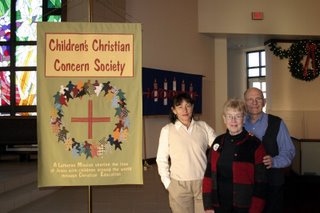 After returning from Tennessee, our next stop was Wichita, Kansas, where we made presentations at Holy Cross Lutheran Church in Wichita and St. Paul's Lutheran Church in Cheney, Kansas, about a half-hour drive from Wichita. We had dinner the evening of December 12 with Jim and Edie Jorns and other board members of the Children's Christian Concern Society (CCCS), a Kansas-based Lutheran mission society that has supported our preschool in Barinas, as well as schools and preschools in Caracas, Maturin and Puerto Ordaz. For that matter, CCCS provides scholarships for needy children attending Christian schools in 12 countries besides Venezuela, including Guatemala, Honduras, El Salvador, Panama, Mexico, Bolivia, Liberia, Chad, Nicaragua, Israel and Sierra Leone.
After returning from Tennessee, our next stop was Wichita, Kansas, where we made presentations at Holy Cross Lutheran Church in Wichita and St. Paul's Lutheran Church in Cheney, Kansas, about a half-hour drive from Wichita. We had dinner the evening of December 12 with Jim and Edie Jorns and other board members of the Children's Christian Concern Society (CCCS), a Kansas-based Lutheran mission society that has supported our preschool in Barinas, as well as schools and preschools in Caracas, Maturin and Puerto Ordaz. For that matter, CCCS provides scholarships for needy children attending Christian schools in 12 countries besides Venezuela, including Guatemala, Honduras, El Salvador, Panama, Mexico, Bolivia, Liberia, Chad, Nicaragua, Israel and Sierra Leone.We learned of parallels between the Jorns' experiences and our own. Jim grew up on a farm in western Kansas and worked for a time as a vocational agriculture teacher. Then in 1964 he and Edie traveled to Guatemala to serve as agricultural missionaries. It was Jim's assignment to train Guatemalans in modern farming techniques. However, they soon discovered a great need for basic Christian education throughout Guatemala. Many children in remote vilages had no opportunity to attend schools of any kind. Jim and Edie organized CCCS in 1968 to support the building of the Lutheran Home for Students, a boarding school in Zacapa, Guatemala. The school, which started with 11 students, over the years has expanded to serve more than 70 children from 22 distinct areas of Guatemala from sixth grade through high school.
CCCS began building schools in other locations in Guatemala, Latin America and eventually the rest of the world. Today they are considering possiblities for projects in India, Ghana, Chile, Peru, Paraguay and Bangladesh.
It was also interesting to talk with Bill Ernsting, like myself a graduate of Fort Hays State University in Hays, Kansas. A mutual acquaintance recently passed away: Dr. Gerald Tomanek, a world-renowned rangeland biologist and former president of Fort Hays State. Upon graduation, Bill and his wife spent two years managing a banana plantation in Honduras (where Bill learned Spanish) before returning the family farm in Kansas.
We also met Julie Atkinson, our CCCS liaison for La Caramuca, and her husband, Tim. Both are Twin Cities natives who have lived in central Kansas for five or six years.
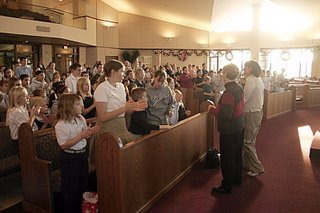 The following morning we made our presentation before 250 children, kindergarten through eight grade, at chapel service at Holy Cross. I explained to them that once I lived on the High Plains of western Kansas and eastern Colorado, where in places you can see the Rocky Mountains on the horizon, but now I live on los Llanos Altos or the High Plains of Venezuela where the mountains you see on the horizon are the Andes. It is cattle country, much like Kansas, although with palm trees, wild parrots, giant iguanas and other things you do not find in Kansas. Wichita, with its population of 3,000, is only a little larger than Barinas, pop. 250,000. Likewise the town of Cheney, pop. 2,000, is only a little larger than La Caramuca, pop. 1,500. Luz Maria led the entire group in a Soanish song with a lot of arm and leg movements, almost like a dance.
The following morning we made our presentation before 250 children, kindergarten through eight grade, at chapel service at Holy Cross. I explained to them that once I lived on the High Plains of western Kansas and eastern Colorado, where in places you can see the Rocky Mountains on the horizon, but now I live on los Llanos Altos or the High Plains of Venezuela where the mountains you see on the horizon are the Andes. It is cattle country, much like Kansas, although with palm trees, wild parrots, giant iguanas and other things you do not find in Kansas. Wichita, with its population of 3,000, is only a little larger than Barinas, pop. 250,000. Likewise the town of Cheney, pop. 2,000, is only a little larger than La Caramuca, pop. 1,500. Luz Maria led the entire group in a Soanish song with a lot of arm and leg movements, almost like a dance.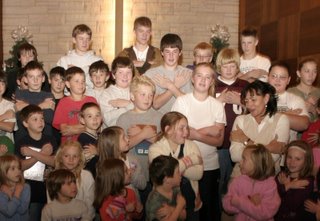 We presented the same program later that morning at chapel service in Cheney. St. Paul's Lutheran School in Cheney has 50 children in its elementary school and 80 children in its preschool program. Principal Keith Jopp showed us around.
We presented the same program later that morning at chapel service in Cheney. St. Paul's Lutheran School in Cheney has 50 children in its elementary school and 80 children in its preschool program. Principal Keith Jopp showed us around.Then we had lunch with Marvin and Marilyn Barz, a retired pastor and his wife. It so happened that the pastor who officiated at their wedding was Alfred Ernst, my father's older brother. Since Pastor Barz had served parishes in Canada for more than 20 years, he was also familiar with Pastor Ted Krey, currently serving as a Lutheran Church - Missouri Synod missionary in Venezuela, and Edmund Mielke, a former missionary to Venezuela and indeed, to Barinas. I had not realized it before, but the cross over the altar at Corpus Christi Lutheran Church in Barinas is modeled after the official symbol of the Lutheran Church of Canada.
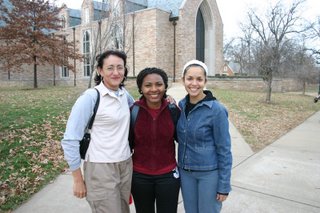 After we returned from Kansas, the cancellation of our trip to Washington gave me time to get an Illinois driver's license to replace the Minnesota license I lost in Missouri. We were then able to borrow my mother's car and visit Concordia Seminary in St. Louis. There we visited Luz Guerrero, who served with us as a volunteer in Monagas, Venezuela, and came down with the team from Minnesota that helped us this past summer. She is now in the deaconess program at Concordia Seminary. Luz introduced us to Ruben Dominguez, a pastor trained at the Lutheran Seminary in Mexico City and now a professor at the Center for Hispanic Studies located at the St. Louis seminary. We also met another of Luz's friends, a young Ethiopian woman who has just started in the deaconess program. She and Luz talked about how wonderful it was to be in an environment where people of many languages and cultural backgrounds could gather to study the Word of God.
After we returned from Kansas, the cancellation of our trip to Washington gave me time to get an Illinois driver's license to replace the Minnesota license I lost in Missouri. We were then able to borrow my mother's car and visit Concordia Seminary in St. Louis. There we visited Luz Guerrero, who served with us as a volunteer in Monagas, Venezuela, and came down with the team from Minnesota that helped us this past summer. She is now in the deaconess program at Concordia Seminary. Luz introduced us to Ruben Dominguez, a pastor trained at the Lutheran Seminary in Mexico City and now a professor at the Center for Hispanic Studies located at the St. Louis seminary. We also met another of Luz's friends, a young Ethiopian woman who has just started in the deaconess program. She and Luz talked about how wonderful it was to be in an environment where people of many languages and cultural backgrounds could gather to study the Word of God.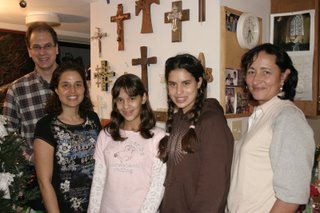 Then we stopped to see Richard and Maritza Schlak, former missionaries to Venezuela. We had some of their daughter's birthday cake and they invited us back on Monday for a devotion/Bible study they host for Spanish-speaking people at the seminary about once a month.
Then we stopped to see Richard and Maritza Schlak, former missionaries to Venezuela. We had some of their daughter's birthday cake and they invited us back on Monday for a devotion/Bible study they host for Spanish-speaking people at the seminary about once a month.We flew back to Venezuela December 19, the day following Bible study at the Schlaks' home, and arrived in time to attend the wedding of Gregori Mireles and Neida Gonzales at El Salvador Lutheran Church. A group of young people traveled from Maracay to attend the wedding, too, including Eduardo Flores, his brother Rafael, and sisters Egnamar and Genesis. When I came to Maracay to study Spanish in 2003, Eduardo was already a young man (he was then 18), but his brother and sisters were still children. Now they are young adults, too. Time just slips away so fast.
Well, I hope I have not left anyone out. As you can see, we could not carry out our work in our little corner of the world without the help of family members and many international friends. God bless you all and have a merry Christmas.
Aug 1, 2005
Mormons muy blancos
When I underwent volunteer missionary training in St. Louis, I received as a freebie a shoulder bag emblazoned with "LCMS World Missions" in an attractive style: light blue text on a black background. I never used the bag; Luz Maria liked it, so I gave it to her. Now she carries it everywhere.
The other day we purchased building supplies for the preschool at a hardware store in Barinas. The sales clerk asked Luz Maria what LCMS stood for. She explained that it meant "la Iglesia Luterana, el Sinodo de Missouri." He asked if that was connected with "la Iglesia de Jesucristo de los Santos de los Ultimos Dias" (Church of Jesus Christ of the Latter-Day Saints).In Venezuela if you say you are "a missionary," it is not unusual for people to respond something along the lines of, "Oh, so you're a Mormon." The Mormons have mounted an aggressive missionary program in this country. Mormon missionaries are everywhere and they just as distinctive in appearance here as in the United States, if not more so. Although they have recruited some Venezuelan "elders," most of the people in charge look like they were just airlifted in from Utah or Idaho (which is probably pretty much the case). One woman, when she could not think of the terms Mormon or Latter-Day Saint, asked us what we thought of that group that was "muy blanco" (very white).
There are white, black and brown (not to mention Asian) Venezuelans, but people described as "white" here generally are not that pale. Other groups, such as the JehovahÂŽs Witnesses and the Muslims, have representatives that look much more like average Venezuelans. Why this is so, I am not really sure.
Anyway, Luz Maria started to explain that the Lutheran Church has no connection with the Mormons, but started in the 16th Century as a reform movement with the Catholic Church. He cut her off, however, by saying he personally worshiped the most powerful of all gods. When Luz Maria asked what god that would be, he replied, "George Washington." By this he meant the U.S. dollar, a potent symbol of economic power and wealth for the many Venezuelans who do in fact worship those things.
To an extent, one can understand this point of view. Life is easier here for people who have access to U.S. dollars, including myself. Due to the strength of the dollar relative to Venezuelan currency, I am able to not only support myself and my wife, but also help Luz Maria's children support her five grandchildren with a fraction of the income I received from my last job in the United States. But we thank the true and living God for this, who grants power and prosperity to all nations according to His will and judges them according to whether they use their power and wealth justly or unjustly.
A critical moment in my decision to enter the mission field was when my previous employer and I had a disagreement over business ethics and the direction the company was moving. My options were to compromise what I believed to be right or lose my job, but my employer really did not want me to leave. His words to me were, "Principles are fine, but everyone has their price." At that point I understood the nature of the choice with which I was presented and what I had to do.
And I have not had any regrets. God has blessed us with support for our ministry and has blessed me with an invaluable partner in Luz Maria. When I came to Venezuela, I did not expect to find such a world of private happiness, but we will have been married two years in November. So I thank God for her, and for the children in La Caramuca that have greatly enriched our lives.I also have to give thanks for another person who played a role in my decision to serve in Venezuela. This past week Martin Lieske died at age 94 in a nursing home in Fond du Lac, Wisconsin, five months after suffering a stroke. The son of a Minnesota farmer, Martin served as the pastor of several rural parishes before being elected president of the Minnesota South District of the Lutheran Church - Missouri Synod in 1966, the first to work in that office on a full-time basis. He was reelected district president in 1970.
I came to know him and his wife, Lucille, as members of the home Bible study group that I attended for four or five years before coming to Venezuela. The Lieskes were mainstays of our group, despite Martin's struggle with cancer. One thing that impressed me about Martin the first time I met him was that although he was of an advanced age, when I took his hand I was met with the strong grip of a farmer in his prime.
Martin was a staunch advocate of mission work and strongly encouraged me to answer the call to Venezuela. For that reason, I shall not forget him.




